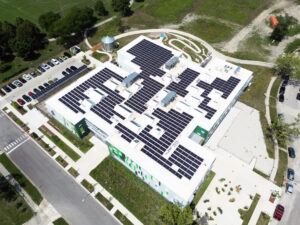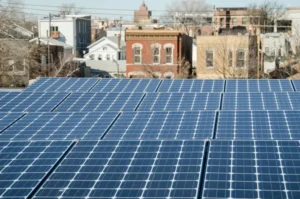In 2025, commercial solar panels are a strategic asset for Chicago businesses as they combat increasing energy costs, environmental concerns, and the need for sustainable business models. By incorporating a solar-calculator into their decision-making process, companies can better estimate potential savings and optimize financing options. This article highlights the benefits, financing options, system design considerations, local provider advantages, market trends, evaluation criteria, and challenges faced when switching to solar power.
What Are the Key Benefits of Solar Panels for Chicago Businesses in 2025?
Solar panels offer benefits that directly improve businesses’ bottom lines and public image. They lower operating costs, boost energy independence, and enhance corporate sustainability. Deploying solar panels strengthens reputation and builds consumer trust by demonstrating a commitment to clean energy.
How Does Solar Power Reduce Operating Costs for Businesses?
Solar power cuts energy expenses by generating electricity from sunlight, offsetting grid consumption and lowering utility bills. Studies indicate that businesses may reduce operating costs by as much as 30% when a major share of energy demand is met by solar power. In addition, lower maintenance needs and minimal fuel costs secure long-term savings.
In What Ways Does Solar Energy Support Chicago’s Sustainability Goals?
Solar energy helps reduce carbon footprints and improve air quality by replacing fossil fuels with renewable energy. Solar installations support municipal goals to lower greenhouse gas emissions and promote energy independence while fulfilling regulatory mandates and reinforcing corporate responsibility toward the community.
How Can Solar Panels Improve Business Reputation and Customer Trust?
Installing solar panels signals a commitment to renewable energy. This proactive move improves reputations by demonstrating responsible practices and often features in corporate social responsibility reports. As a result, customers increasingly favor businesses that invest in renewable energy solutions.
Which Financial Incentives and Financing Options Are Available for Chicago Commercial Solar?
Chicago businesses can access various financial incentives to reduce installation costs. These include state and local incentives, solar loans, power purchase agreements (PPAs), rebates, and tax credits, which collectively maximize return on investment while lowering upfront costs.
What Local and State Solar Incentives Can Chicago Businesses Access?
Local and state governments offer property tax exemptions, sales tax exemptions on solar equipment, and rebates that significantly reduce installation expenses. Additionally, renewable energy certificates (RECs) can create a revenue stream once energy is generated on site.
How Do Solar Loans and Power Purchase Agreements (PPAs) Work for Businesses?
Solar loans provide fixed-rate financing that spreads the cost of installation over several years, eventually leading to system ownership. Conversely, PPAs allow businesses to install solar systems with no upfront investment by paying a set rate for the electricity produced, thus enabling immediate energy savings and improved cash flow.
How Can Businesses Maximize ROI Through Available Rebates and Tax Credits?
By leveraging federal and state tax credits, such as the Investment Tax Credit (ITC) which can cover 26–30% of installation costs, businesses can enhance ROI. When paired with accelerated depreciation options like MACRS, these benefits may considerably shorten the solar investment payback period.
How Do Chicago Commercial Solar Companies Design and Install Customized Solar Panel Systems?
Chicago commercial solar companies design tailored systems to match each business’s energy needs, rooftop dimensions, and site conditions. Customization is key to maximizing energy production and overall system efficiency.
What Factors Influence Solar System Design for Different Business Types?
Design factors include available roof space, building orientation, local shading, and current energy consumption. For flat roofs, ground-mount solar panels may optimize sunlight capture. Detailed energy audits help determine the most effective system size and configuration, balancing design costs with energy output.
How Is the Installation Process Managed From Permitting to Commissioning?
The installation process starts with a detailed design, followed by securing permits and then system installation and commissioning. Professional solar EPC providers manage the process to ensure regulatory compliance and safety while keeping disruptions to daily operations to a minimum.
What Ongoing Support and Maintenance Services Are Offered by Solar EPC Providers?
After installation, maintenance contracts provide regular performance monitoring, scheduled cleaning, and prompt repairs. These services, often including warranty coverage, help maintain efficiency and extend the system’s 25-year operational life.
Why Are Chicago Business Leaders Choosing Local Solar EPC Companies in 2025?
Local solar EPC companies offer a deep understanding of Chicago’s regulations and market trends, making them preferred partners. Their local expertise ensures customized solutions that often perform better than those offered by national providers.
What Advantages Do Local Solar Providers Offer Over National Competitors?
Local providers offer quicker response times and personalized service with in-depth knowledge of local incentive programs, permitting procedures, and regulatory compliance. This proximity helps streamline projects from design through to commissioning, often resulting in better pricing and reliable system performance.
How Does Local Expertise Impact Solar Incentive Navigation and Compliance?
Local solar experts navigate state and local incentive programs skillfully and ensure compliance with evolving regulations. Their hands-on approach minimizes delays and maximizes benefits like tax credits and rebates, keeping projects on schedule and within regulatory standards.
What Are Chicago Businesses Saying About Their Experiences With Local Solar Companies?
Testimonials reveal that local solar providers significantly improve cash flow and reduce energy costs. Positive feedback emphasizes effective communication, speedy installation, and dependable long-term maintenance services.
What Are the Environmental and Economic Trends Driving Solar Adoption Among Chicago Businesses?
Rising energy costs and a greater commitment to sustainability are driving solar adoption among Chicago businesses. A shift away from fossil fuels toward renewable energy, supported by economic incentives, positions solar power as a critical tool for future energy security.
How Are Rising Energy Costs Influencing Solar Power Decisions?
Increasing electricity rates and high peak demand charges are causing businesses to reconsider traditional energy sources. Solar installations help lock in lower energy rates, reducing risks associated with energy cost fluctuations and providing better budget predictability.
What Role Does Corporate Social Responsibility Play in Solar Adoption?
Corporate social responsibility (CSR) is a major driver for solar adoption. Companies that install solar panels enhance their public image while aligning with sustainability goals, attracting investors and customers who prioritize ethical practices.
How Is Chicago’s Solar Market Expected to Evolve Beyond 2025?
Advancements in photovoltaic technology, reducing installation costs, and improving battery storage are expected to further expand Chicago’s solar market. Forecasts predict that a larger share of commercial energy consumption in Chicago will soon come from local solar projects, reinforcing the city’s renewable energy commitment.
How Can Chicago Businesses Evaluate and Choose the Right Commercial Solar Panel System?
Evaluating solar panel systems involves comparing technical specifications and financial factors to match operational needs and long-term goals.
What Criteria Should Businesses Use to Compare Solar Panel Technologies?
Key criteria include efficiency ratings, degradation rates, warranty periods, and installation costs. For instance, monocrystalline panels usually deliver better performance than polycrystalline options in dense urban settings. Compatibility with existing electrical systems is also essential.
How Important Is System Scalability and Energy Efficiency?
Systems should be scalable to meet future energy demands while maintaining high energy efficiency to ensure a strong return on investment. Advanced panels integrated with monitoring and energy storage systems offer long-term reliability and enhanced performance.
What Questions Should Businesses Ask Potential Solar EPC Providers?
Essential questions include inquiries about service warranties, post-installation maintenance, performance guarantees, financing options, permitting processes, installation timelines, and local incentive experience. Transparent pricing and detailed case studies help ensure that the provider meets the business’s energy goals.
What Are the Common Challenges Chicago Businesses Face When Switching to Solar Power?
Transitioning to solar power can present challenges such as permitting delays, maintenance issues, and high upfront costs that impact cash flow. Early planning and choosing experienced partners can help overcome these obstacles.
How Can Businesses Overcome Installation and Permitting Delays?
Working with seasoned local solar EPC providers helps streamline permitting and installation processes. Early engagement with local authorities and clear documentation are key to reducing delays.
What Are the Typical Maintenance Concerns and How Are They Managed?
Common maintenance challenges include cleaning, inverter replacements, and monitoring for system degradation. Regular audits, scheduled cleaning, and prompt repair services under comprehensive maintenance contracts help keep systems operating efficiently.
How Do Businesses Address Initial Investment and Cash Flow Issues?
High initial costs can be managed with leases, power purchase agreements, or solar loans, which distribute expenses over time. Additionally, federal, state, and local tax incentives further reduce net costs and accelerate the payback period.
Frequently Asked Questions
Q: How quickly can a Chicago business see a reduction in energy costs after installing solar panels?
A: Many businesses notice reduced energy costs within the first year, often saving 20–30% on their electricity bills.
Q: Are there financing options available to offset the high upfront costs of solar installations?
A: Yes, options such as solar loans, power purchase agreements, and leasing can help spread out the costs.
Q: How does local expertise benefit Chicago businesses during the solar installation process?
A: Local providers understand Chicago’s incentives and regulatory requirements, ensuring smooth permitting and maximized financial benefits.
Q: What level of maintenance is required to keep commercial solar systems operating efficiently?
A: Regular cleaning, periodic audits, and timely repairs are essential and are typically covered under service agreements.
Q: Can installing solar panels improve a company’s public image and customer trust?
A: Absolutely; adopting renewable energy enhances corporate social responsibility, boosting reputation and customer loyalty.
Final Thoughts
Solar panels in Chicago are a smart investment in energy efficiency, environmental stewardship, and corporate reputation. With local incentives, custom system designs, and various financing options, businesses can lower operating costs while promoting sustainability. As energy prices rise and regulatory demands increase, switching to solar power helps companies secure long-term growth and competitiveness. Call (312) 588-6953 or visit https://windfree.us/contact/ to learn how Windfree Solar can help you make the switch.




